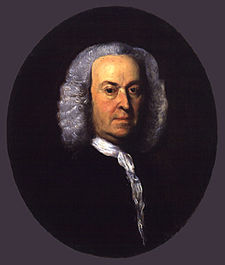“Such a prudent and proper Use of this Letter”
Among those passengers was a new Customs officer named Thomas Irving, who carried a letter of introduction to Gov. Francis Bernard. The economic historian John McCusker reports that letter was dated 23 Oct 1767 and marked as received on Sunday, 30 Jan 1768, which gives us a benchmark for other letters that may have traveled on the Abigail.
On Monday, 1 February, in the Representatives’ chamber:
The Speaker [Thomas Cushing] communicated a Letter from Dennys DeBerdt, Esq; which was read and communicated for Consideration to Mr. Speaker, Capt. [Edward] Sheaffe, and Brigadier [Timothy] Ruggles.The Colonial Society of Massachusetts published a set of DeBerdt’s letters in 1911. One of those was dated 21 Oct 1767, shortly before the Abigail set sail, and addressed to Whig legislator Edward Sheaffe of Charlestown, appointed to the committee to reply. It’s possible that Cushing brought forward another letter that hasn’t survived, but this appears to be the most likely candidate.
In that letter DeBerdt pressed to be appointed as the official lobbyist for the whole Massachusetts provincial government, not just the House. He added, probably as a sign of his access, “I shall have a Conference with the Secretary of State in a few days…“
That likely reminded legislators of DeBerdt’s last letter to Cushing, dated 19 Sept 1767, in which he wrote about the Earl of Shelburne being sympathetic to the colonies and added:
He had also wrote to every Governour on the continent to behave with temper & moderation to the severl. Provinces over which they preside, & he had wrote to your Governour in particular to persue healing measures & was so condesending to offer shewing me Copy of his letter the next time I waited on HimThe Massachusetts Whigs had been so pleased with that assurance that London wanted their governor to act more moderate that they had the letter published in the 10 November Boston Gazette.
On Wednesday, 3 Feb 1768, the legislators were treated to a different message from London:
Mr. Secretary [Andrew Oliver, shown above], by Order of the Governor, came down and Read in the House a Letter from the Right Honorable the Earl of Shelburne to his Excellency [the governor], and then withdrew.Bernard had just received a copy of Secretary of State Shelburne’s letter dated 17 September, forwarded from New York. (The signed original didn’t arrive until April, amazingly late.) This was the dispatch that DeBerdt had suggested would show Shelburne advising more “healing measures.”
Instead, that letter offered Bernard solid support for all the steps he had taken. Shelburne began, “I have the Pleasure to signify to you His Majesty’s Approbation of your Conduct, and to acquaint you that he is graciously pleased to approve of your having exerted the Power…” He went on to say:
I am to inform you, Sir, that it is His Majesty’s determined Resolution to extend to you His Countenance and Protection in every Constitutional Measure that shall be found necessary for the Support of His Government in the Massachusets Bay.No doubt pleased, Bernard replied:
I shall make such a prudent and proper Use of this Letter, as I hope it will restore the Peace and Tranquility of this Province, for which Purpose considerable Steps have already been made by the House of Representatives.The “prudent and proper Use of this Letter” that Bernard planned was to have Secretary Oliver read it to the House, pushing lawmakers to recognize the reality that he had the royal government behind him.
That didn’t work. Instead, the very next day the House decided to repudiate its earlier vote not to send a circular letter to the other colonial legislatures. Whatever “considerable Steps” toward “Peace and Tranquility” Bernard perceived on 2 February were gone two days later. The House decided to communicate with other colonial governments, even if that did breach protocol.
Furthermore, Massachusetts legislators focused on one phrase from Shelburne: “from your several Letters.” For the rest of the session, House leaders periodically asked Bernard for “a Copy of the Letter from the Right Honorable the Earl of Shelburn, lately read to the House by Order of his Excellency, and his own several Letters to which it refers.” The governor gave Cushing a copy of Shelburne’s letter but stonewalled on sharing his own, which is what the Whigs really wanted.
As discussed back here, Massachusetts politicians were convinced Bernard was writing bad things about them to London. All the more reason to form a united front with other colonial legislatures!
And all that time, nobody in Boston knew that the Earl of Shelburne’s opinions no longer mattered. There had been a shakeup in the British government. The Earl of Hillsborough had assumed responsibility for the North American colonies, and he was stricter than his predecessor.
TOMORROW: What was so important about the February 1768 circular letter.


